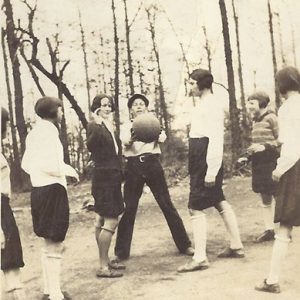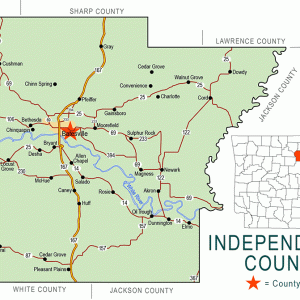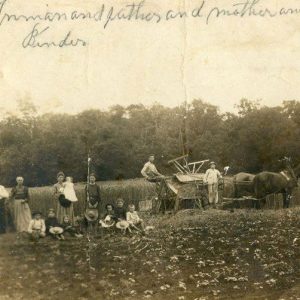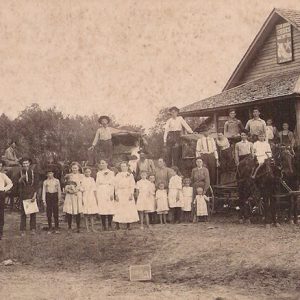calsfoundation@cals.org
McHue (Independence County)
The community of McHue in Independence County is located about four miles away from Hutchinson Mountain and the community of Hutchinson (Independence County), or about six miles south of the White River. Before McHue was founded in 1896, the Alderbrook (or Alder Brook) post office, located just south of what is today Desha (Independence County) on the Jamestown Road, served the entire area—as did, for a short time, a post office which opened in Jamestown (Independence County) in 1881—and the settlement was often referred to as Alderbrook. The small community was once a commercial hub for the region, but, in the twenty-first century, agriculture is the chief vocation for residents.
In the vicinity of where McHue now sits was a Native American town called Coligua, located in the Greenbrier bottoms. Coligua flourished from approximately 1350 until about 1555. Evidence of burning has been found by archaeologists from Arkansas State University headed by Dr. Julie Morrow, leading to speculation that Hernando de Soto and his men may have had a hand in the town’s disappearance during his time in the area in October–November 1541. Indian mounds dot the landscape along Double Branches at the confluence of Caney and Muddy creeks at McHue on the old Rosenbaum farm.
One of the early settlers of McHue was Edward D. Taylor from Missouri, who settled along the creeks (Inman, Caney, and Alderbrook). Where two mountains—today called Cobb and Jamestown mountains—meet, Taylor built his home place, which included a smokehouse; a corral and pens for cows, hogs, and horses; a storm cellar; a hand-dug well; a corn crib; and an outhouse. The soil was fertile for farming such crops as cotton, sugar cane, and corn. Taylor married Lucinda Hubble in 1828, and they began a large family. By the time of Taylor’s death in 1860, the region between the two mountains was called the Ed Taylor Holler.
Another pioneering family of what became McHue was the Long family, consisting of Nicholas (Nick) Long; his wife, Hannah Churchman; and their children. Many of their descendants still live in the McHue area in the twenty-first century. Jake Long fought for the Confederacy in the Battle of Murfreesboro in Tennessee, where he suffered a gunshot wound to the elbow.
Nick and Hannah Long’s daughter Susan married John Graddy (or Grady), who became involved in a fracas at Leinenweaver Spring at McHue, then called the Gilbert Spring, during the early days of the Civil War. A “rebel rouser” (a recruiter for the Confederate cause) was standing on a rock haranguing a large crowd. John Graddy and his brother Lewis did not agree with a few of the man’s words and took him to task. Suddenly, the recruiter pulled a gun and aimed it at John Graddy’s heart. Lewis Graddy quickly drew his bowie knife and threw it, killing the recruiter. John and Lewis Graddy then took their families to Illinois for the duration of the war. Upon returning, both were tried at the courthouse in Batesville (Independence County) and found innocent on grounds of self-defense.
In 1827, Abram Allen and his wife, Isabella (Sibella) Allen, came from Orange County, North Carolina, by way of Tennessee, to join Abram Allen’s parents, Samuel Allen and Elizabeth Barbee Allen, who had settled in what is today McHue in 1824. One of their daughters, Sarah Elizabeth Allen, married Colonel Thomas Jefferson (Tom) Morgan from South Carolina, who became a prominent leader of McHue. The Morgan land was located just south of where the McClendon/Mayhue store would later be built. Col. Morgan served in Company B of the Eighth Arkansas Infantry (Confederate). Other pioneer families of note were the Stewart, Inman, Peel, and Apple families.
In 1896, William Amos Mayhue and his wife, Cynthia Edna McClendon Mayhue, opened a general store across from the intersection of the wagon road leading to Hutchinson Mountain and the road leading to the thriving town of Jamestown—today, the intersection of Camp Tahkodah Road and Locust Grove Road on Highway 230. When the general store added a post office and Mayhue was appointed postmaster on July 3, 1896, the community of McHue was born. The name of the community is a combination of the McClendon and Mayhue family names.
Cynthia Mayhue’s nephew, Dexter Hugh (Deck) McClendon, a local entrepreneur, made the McHue store successful by supplying the farming and household needs for the area. Cynthia’s brother, Claud McClendon, and his wife, Laura Leona Mayhue (half-sister to William), also helped run the general store and post office. Audrey Creech Apple, Hubert Creech, and Colleen Crowell Creech ran the old store for a time during World War II, but then Deck McClendon and his wife, Mary Mayes McClendon, resumed operation of it from February 15, 1944, until it went out of business in the late 1940s.
The McClendon/Mayhue store stood abandoned for several years. Walden Mayes, a brother-in-law to Deck and a bachelor, lived next to the old store and kept the building up until his death in 1968. Ray Patterson, who had worked in the old store, opened a new store and post office across the road after the old store’s demise. The McHue Post Office closed in 1973, and Patterson retired. Brothers Don Harris and James Harris bought the store in 2005 and continued the operations as a general store; they painted the building red, after which it became known as the Little Red Store. The building burned in 2012 but was rebuilt by James Harris and turned into a feed store in 2014.
Until 1948 consolidations with the new school of Southside (Independence County), the McHue community had three one-room county schools for grades 1–8. One was called the Baker School, for the Allen Baker family, another was the Salem School, and the third was the Egner-Powell School, for William Egner and his wife, Sarah Jane Powell, who donated the land. At one time, McHue had a very active United Methodist church, but it was demolished, and the members transferred to a church at Southside.
Morgan Powell, born in McHue, was a rear admiral in the U.S. Navy.
For additional information:
Biographical and Historical Memoirs of Northeast Arkansas. Chicago: Goodspeed Publishing Co., 1889.
Clements, Kathy. “McHue, Named after Army Soldier, Was Once Site of Several Robberies.” Arkansas Democrat-Gazette Three Rivers Section. May 14, 2000, p. 6S.
McGinnis, A. C. “A History of Independence County, Ark.” Special issue. Independence County Chronicle 17 (April 1976).
Morrow, Julie. “Ongoing Research and Laboratory Analyses of Materials Recovered from the Greenbrier Site, 3IN1.” Field Notes Bulletin of the Arkansas Archeological Society 309 (2003): 3–6.
Stewart, Clyde. “McHue Named For Two Pioneer Families.” Independence County Chronicle 3 (April 1962): 40–47.
Kenneth W. Rorie
Van Buren, Arkansas
 Baker School Students
Baker School Students  Independence County Map
Independence County Map  Inman Family
Inman Family  McHue Post Office
McHue Post Office 




Comments
No comments on this entry yet.